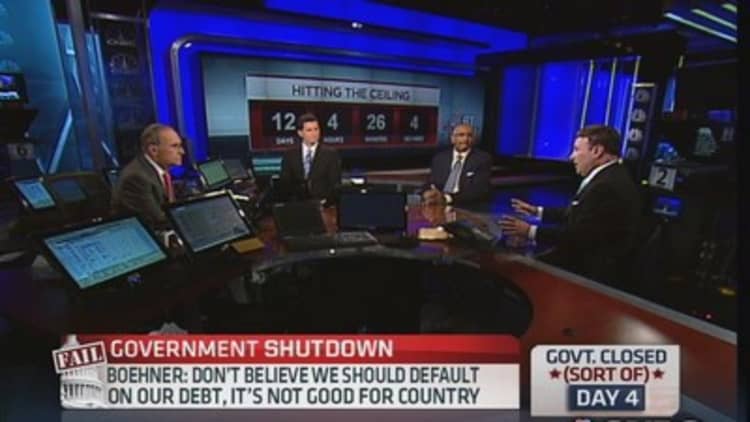The prospect of a Grand Bargain over Washington's political impasse is still alive. We talked last week about the elusive deal that would end the shutdown, increase the debt ceiling, keeping Obamacare intact, make a few entitlement reforms (change the Social Security cost of living adjustment (COLA)), and possibly approving the long-delayed Keystone XL pipeline.
That much-maligned deal is not dead. There are reports that Senator Rob Portman (R., Ohio) is working on a deal that would include many of those elements, including a continuing resolution that goes for at least one year.
Of course, it will likely prove impossible to implement, and the likely deal is just another patchwork agreement to keep the government open for a few weeks.
Elsewhere

1) earnings season is upon us, finally. Alcoa which will announce after-the-bell, is still the first company in the S&P 500 to report that has its quarter ending in September.
Alcoa has long since being a bellweather, but I will be curious to see if they maintain or raise their aluminum guidance. In July, they affirmed expectations of a seven percent increase in global aluminum demand. The aluminum industry has underperformed the Materials sector, which underperformed the S&P, for some time now. Any change in that estimate will move the group up. Materials are up 11 percent this year, while the S&P up 17 percent.
However, the emphasis is on JP Morgan and Wells Fargo on Friday. I noted last week that we have seen lower mortgage production, weaker fixed income trading, and a likely increase in provision for legal settlements. Commercial and Industrial loan growth appears to be slower than previous quarters.
One other problem: While credit quality remains good, banks are slowly running out of reserves that can be released. Offsetting weaker fixed income trading should be better investment banking (initial public offering and secondary markets--watch Morgan Stanley in the event of that happening).
All this is well-known, and that is the primary reason banks have underperformed recently. More recently, it has dawned on everyone that short-term interest rates are likely to remain low longer than anticipated. A flat yield curve is not great for banks. That will be a drag on earnings.
My point is that fourth quarter bank earnings, and even 2014 numbers, are likely too high.
Oddly, JP Morgan, which other than Bank of America has the most complex of bank reports, may have fewer surprises since management has already provided abundant details on the quarter's results. One question that remains is whether legal reserves will be hiked.
Normally, banks will begin trading down as earnings season starts.
2) I noted yesterday that retailers were moving to multi-day lows, particularly Abercrombie (which actually hit its lows for the year), Target (its lowest since March), and Gap (the lowest since May). There was no specific news. However, there is plenty of concern that a slightly desperate JC Penney might engage in very heavy promotions for the Christmas season.
3) Speaking of which, Penney climbed more than six percent after the troubled retailer said September same-store sales increased month over month. Traffic was down four percent in September, but improved 5.8 percent from August. Online sales rose 25.3 percent last month, versus a 10.8 percent gain in August. "Over the last six months, we have made significant strides and are now seeing positive signs in many important areas of the business," said CEO Mike Ullman. "We are still in the early stages of a turnaround."
—By CNBC's Bob Pisani


